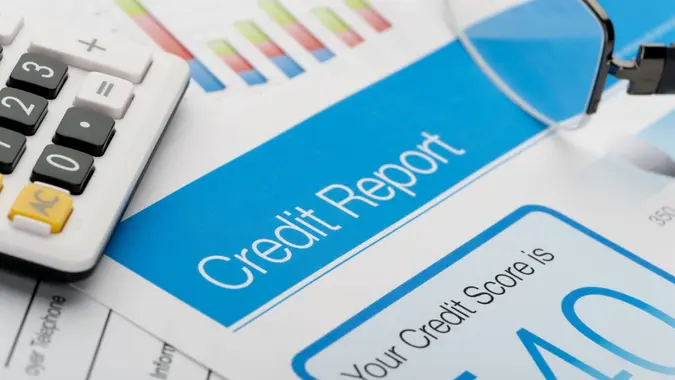Building Credit With a Debit Card: Is It Possible?

Commitment to Our Readers
GOBankingRates' editorial team is committed to bringing you unbiased reviews and information. We use data-driven methodologies to evaluate financial products and services - our reviews and ratings are not influenced by advertisers. You can read more about our editorial guidelines and our products and services review methodology.

20 Years
Helping You Live Richer

Reviewed
by Experts

Trusted by
Millions of Readers
Building a strong credit history is a key aspect of personal finance. Many are familiar with credit cards as a means to this end, but there’s often curiosity about how debit cards factor in. Keep reading to learn more about the role of debit cards and other strategies for establishing a solid credit foundation.
Can You Build Credit With a Debit Card?
Debit cards don’t directly influence credit scores but they play a critical role in overall financial health. Responsible use of a debit card, such as avoiding overdrafts and managing your spending, establishes good financial habits that are beneficial when you eventually use credit products.
Does Paying Bills With a Debit Card Affect Credit Score?
No, paying bills with a debit card does not affect your credit score. Debit card transactions are not reported to credit bureaus as they reflect your spending of existing funds, not borrowed money. Unlike credit cards, which demonstrate how you handle borrowed funds, debit cards do not provide a record of credit management.
Understanding Credit Reporting
Credit scores, the numerical representation of your creditworthiness, are derived from your credit report. This report is a collection of your financial behaviors, particularly related to borrowed funds. Here’s a closer look at the components:
- Credit accounts: Lists all your credit accounts, including credit cards, mortgages and auto loans. It will show the opening date, credit limit or loan amount, account balance and payment history.
- Credit inquiries: Tracks both hard and soft inquiries made by lenders or yourself.
- Public records: Includes any bankruptcies, foreclosures, liens and judgments.
- Personal information: Contains your name, address, Social Security number and possibly employment information.
Each of these elements plays a role in forming your credit score. Regular, responsible management of credit — timely payments and maintaining low balances relative to your credit limits — positively affects your score. The report does not include personal transactions or account balances for non-credit accounts like checking or savings. Understanding these components is key to comprehending how your financial actions influence your credit score.
Alternative Credit Building Strategies
Building a strong credit history is essential for financial health, and several strategies beyond traditional credit card usage can help achieve this.
Secured Credit Cards
Secured credit cards are a reliable way to build credit, especially for those with no credit history or looking to rebuild credit. You make a deposit that serves as your credit limit, reducing the risk for the issuer. These cards report to credit bureaus, helping establish a credit history as long as you make timely payments.
Credit-Builder Loans
Credit-builder loans are designed specifically for building credit. Unlike traditional loans, you don’t receive the borrowed money upfront. Instead, the lender holds it in a savings account, releasing the funds only after you’ve completed all the payments. This process helps you build savings and credit simultaneously.
Becoming an Authorized User
Being added as an authorized user on someone else’s credit card can be a strategic move. If the primary cardholder has a good credit history and habits, their positive record will reflect on your credit report. However, it’s crucial to ensure that the primary cardholder maintains good credit habits to avoid negative impacts.
Final Take
While debit cards are excellent tools for managing personal finances, they do not directly contribute to building credit. To establish and improve your credit score, focus on credit-building products and practices that demonstrate your ability to manage and repay borrowed funds responsibly.
FAQ
Here are the answers to some of the most frequently asked questions regarding debit cards and credit scores.- Do debit card payments affect your credit score?
- No, debit card payments do not affect your credit score because they do not represent borrowed money.
- Is it better to pay bills with a credit card or debit card?
- Paying bills with a credit card can help build credit if payments are made on time. Debit cards do not impact credit but can help avoid debt accumulation.
- Does my debit card balance affect my credit score?
- No, your debit card balance does not affect your credit score as it reflects your own money, not credit usage.
Editor's note: This article was produced via automated technology and then fine-tuned and verified for accuracy by a member of GOBankingRates' editorial team.
 Written by
Written by 























